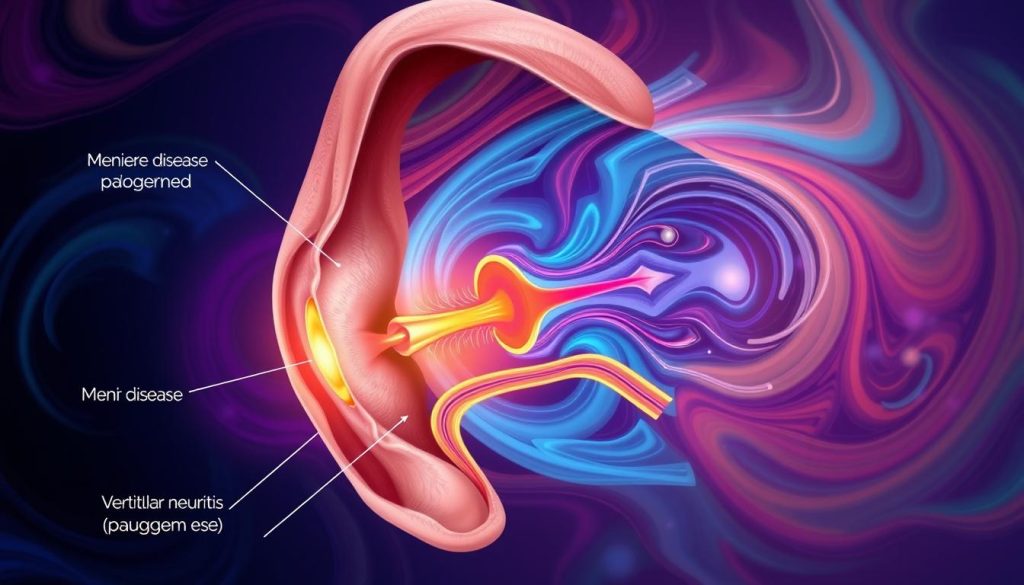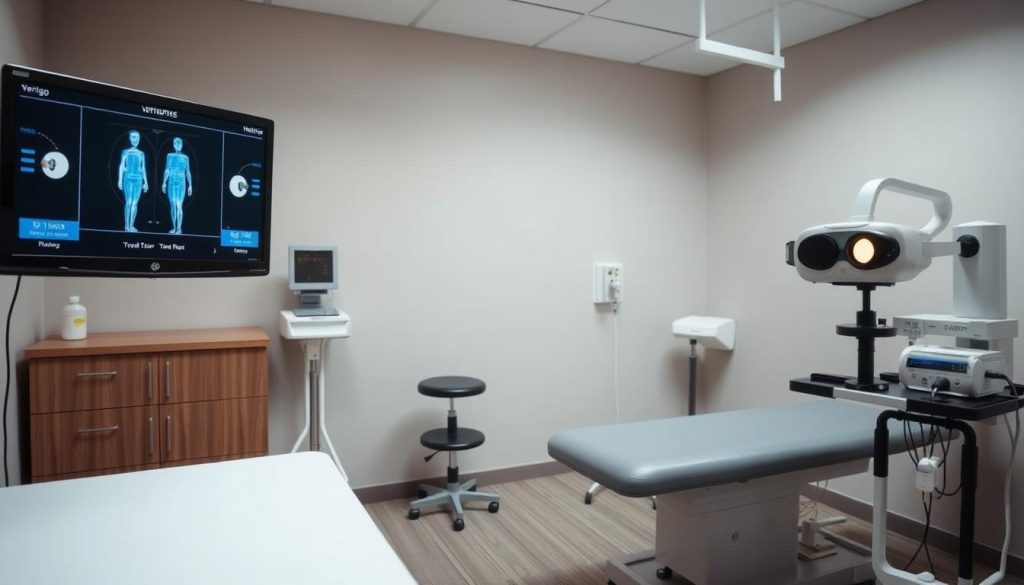Vertigo symptoms can be very unsettling. They make people feel like they’re spinning and can’t stay steady. But, vertigo isn’t a condition itself. It’s a sign of something else going on in the body.
Knowing what causes vertigo is key to getting the right treatment. It can be due to problems in the inner ear or even neurological issues. By looking into these causes, we can understand why vertigo happens and how to stop it.
We’ll look at the main reasons for vertigo, its symptoms, and when to see a doctor. This information will help you manage your health and reduce vertigo’s impact on your life.
Understanding Vertigo: Definition and Basic Concepts
Vertigo makes you feel like you’re spinning or dizzy. It’s a feeling that can be really disorienting. It’s often caused by problems with the vestibular system, which helps us balance and know where we are in space.
Unlike just feeling dizzy, vertigo makes you feel like you’re moving, even if you’re not. This can be really unsettling.
Difference Between Vertigo and Dizziness
Many people think vertigo and dizziness are the same, but they’re not. Dizziness is a more general feeling of being off-balance or lightheaded. Vertigo, however, is a specific feeling of spinning or movement, even when you’re standing still.
This difference is important for doctors to figure out what’s wrong and how to treat it.
How the Balance System Works
Our balance system is complex. It involves the inner ear, eyes, and nerves. The vestibular system in the inner ear is especially important. It helps us sense head movements and stay balanced.
Types of Vertigo Episodes
Vertigo can be divided into two main types:
- Peripheral vertigo: This comes from problems in the inner ear.
- Central vertigo: This is caused by issues in the brain or nervous system.
Knowing these differences helps doctors find out what’s causing vertigo. They can then choose the best treatment for each type.
What Is Vertigo a Symptom Of: Medical Conditions Overview
Vertigo can come from many medical issues. Knowing what causes vertigo is key to finding the right treatment. Inner ear problems are a big reason, but other health issues can cause it too.
- Vestibular system disorders
- Neurological conditions
- Cardiovascular issues
- Medications and toxins
Inner ear issues often lead to vertigo. This includes Benign Paroxysmal Positional Vertigo (BPPV), Meniere’s disease, and vestibular neuritis. BPPV happens when tiny crystals in the inner ear move, causing short spells of dizziness.
Neurological problems like migraines, multiple sclerosis, and brain tumors can also cause vertigo. Sometimes, heart issues might be the reason. Some medicines or toxins can make you feel dizzy too.
Finding out why you have vertigo is important for treatment. If vertigo keeps happening, see a doctor. They can figure out what’s causing it and suggest the best treatment.
Inner Ear Disorders and Vestibular Problems
Inner ear disorders are common causes of vertigo. They affect the vestibular system, leading to balance issues and dizziness. Let’s look at three major inner ear disorders linked to vertigo.
Benign Paroxysmal Positional Vertigo (BPPV)
BPPV happens when tiny crystals in your inner ear move out of place. It causes brief vertigo episodes with head movements. Treatment often involves simple repositioning maneuvers.

Labyrinthitis and Vestibular Neuritis
These conditions are inflammatory and affect the inner ear and vestibular nerve. Labyrinthitis impacts both hearing and balance, while vestibular neuritis only affects balance. Both can cause severe vertigo lasting days or weeks.
Meniere’s Disease
Meniere’s disease is a chronic condition of the inner ear. It causes vertigo attacks, hearing loss, and tinnitus. It’s thought to be caused by fluid buildup in the inner ear.
| Disorder | Main Symptoms | Duration |
|---|---|---|
| BPPV | Brief vertigo with head movements | Seconds to minutes |
| Labyrinthitis | Vertigo, hearing loss, dizziness | Days to weeks |
| Vestibular Neuritis | Vertigo, dizziness, nausea | Days to weeks |
| Meniere’s Disease | Vertigo, hearing loss, tinnitus | 20 minutes to 24 hours |
Knowing about these inner ear disorders can help you understand vertigo causes. If vertigo keeps happening, see a doctor for the right diagnosis and treatment.
Neurological Causes of Vertigo
Vertigo can come from many neurological issues. These problems affect how the brain handles balance. They can cause intense dizziness and feeling off-balance.
Vestibular migraines often lead to vertigo. Unlike regular headaches, these migraines mainly cause balance problems. People with vestibular migraines might feel dizzy for hours or even days.
Multiple sclerosis (MS) can also cause vertigo. This disease damages the protective covering of nerve fibers. When MS hits areas that control balance, vertigo can happen.
Brain tumors, though rare, can also cause vertigo. Tumors pressing on the balance nerve or brain areas can disrupt balance. This leads to ongoing dizziness and vertigo.
Strokes in the brainstem or cerebellum can cause sudden, severe vertigo. This vertigo, known as central vertigo, often comes with other symptoms like slurred speech or trouble walking.
“Understanding the underlying neurological causes of vertigo is crucial for proper diagnosis and treatment,” says Dr. Emily Chen, a neurologist specializing in balance disorders.
It’s important to catch these conditions early. Regular health check-ups and screenings can help find problems before they get worse.
| Neurological Condition | Vertigo Characteristics | Associated Symptoms |
|---|---|---|
| Vestibular Migraine | Episodic, can last hours to days | Light sensitivity, nausea |
| Multiple Sclerosis | Can be persistent or intermittent | Fatigue, vision problems |
| Brain Tumor | Often persistent and progressive | Headaches, cognitive changes |
| Stroke | Sudden onset, severe | Weakness, speech difficulties |
Common Signs and Symptoms Associated with Vertigo
It’s important to know the signs of vertigo. Vertigo can show up in many ways, affecting people differently. Here are the common signs and physical symptoms that often come with vertigo episodes.
Physical Symptoms During Episodes
Vertigo symptoms can be confusing and uncomfortable. People with vertigo often say they feel like they’re spinning. They might also feel off balance, nauseous, or have headaches.
- Spinning sensation
- Loss of balance
- Nausea and vomiting
- Headaches
- Sweating
- Ringing in the ears
Duration and Intensity Patterns
Vertigo episodes can last from seconds to hours. Some people have short, intense spells. Others might feel dizzy for a long time.
| Duration | Intensity | Possible Cause |
|---|---|---|
| Seconds to minutes | Severe | BPPV |
| Hours to days | Moderate to severe | Vestibular neuritis |
| 20 minutes to 24 hours | Varies | Meniere’s disease |
Warning Signs to Watch For
While vertigo is usually not serious, some symptoms need quick medical help. Look out for:
- Sudden, severe headache
- Double vision or vision loss
- Slurred speech
- Weakness in limbs
- Loss of consciousness
If you have these symptoms with vertigo, get emergency care right away. Knowing what vertigo is a symptom of helps find the right treatment.
Diagnostic Procedures and Tests for Vertigo
Diagnosing vertigo requires different tests and methods. Doctors use physical exams, imaging tests, and balance tests to find the cause of vertigo.
Physical Examination Methods
Doctors start with a detailed physical exam. They might use the Dix-Hallpike test to trigger vertigo. They also check eye movements and how the body responds to head changes.
Imaging Tests and Scans
Imaging tests are key when the inner ear or brain might be involved. MRI and CT scans show detailed images. They help find tumors or other problems.

Balance Function Tests
Special tests are needed to fully diagnose vertigo. These include:
- Electronystagmography (ENG): Checks eye movements to see if the inner ear is working right
- Videonystagmography (VNG): Uses cameras to record eye movements during different tests
- Posturography: Tests balance on different surfaces
| Test | Purpose | Duration |
|---|---|---|
| Dix-Hallpike | Diagnose BPPV | 5-10 minutes |
| MRI | Detect brain abnormalities | 30-60 minutes |
| VNG | Assess vestibular function | 1-2 hours |
These tests help doctors find the best treatment for vertigo. Early and accurate diagnosis is crucial for managing symptoms.
Treatment Options and Management Strategies
Effective vertigo treatment starts with finding the cause. Doctors use many ways to manage symptoms and fix the problem. Let’s look at some common ways to help with vertigo.
Medicines are key in treating vertigo. Antihistamines and anticholinergics help with dizziness and nausea. For serious cases, doctors might use stronger drugs like benzodiazepines to help with anxiety and vertigo.
Vestibular rehabilitation therapy is important for managing vertigo long-term. This therapy helps the brain get better at balancing. Patients do exercises to improve their balance and posture.
For certain vertigo causes, there are specific treatments:
- BPPV: Canalith repositioning maneuvers
- Meniere’s disease: Dietary changes and diuretics
- Vestibular neuritis: Corticosteroids and antiviral medications
In some cases, surgery is needed for severe or ongoing vertigo. These surgeries fix problems in the inner ear or vestibular nerve.
| Treatment Approach | Benefits | Considerations |
|---|---|---|
| Medications | Quick symptom relief | Potential side effects |
| Vestibular Rehabilitation | Long-term improvement | Requires patience and commitment |
| Targeted Therapies | Addresses specific causes | May need multiple treatments |
| Surgery | Permanent solution for severe cases | Invasive, potential risks |
A good vertigo treatment plan often uses more than one method. Patients should work with their doctors to find the best plan for them. This plan should match their specific needs and vertigo causes.
Lifestyle Modifications and Prevention Methods
Managing vertigo is not just about medical treatment. Making lifestyle changes can help a lot. Knowing what vertigo is a symptom of helps make these changes better.
Dietary Changes and Restrictions
Some foods and drinks can make vertigo worse. Try to eat less salt, caffeine, and alcohol. Eating foods rich in vitamins and minerals helps your ears stay healthy. Drinking plenty of water is also important for your inner ear.
Exercise and Physical Therapy
Exercises can improve your balance and reduce vertigo. The Epley maneuver helps move crystals in your inner ear. Tai Chi and yoga can also help with balance and coordination. Regular physical therapy can help manage vertigo long-term.
Stress Management Techniques
Stress can make vertigo symptoms worse. It’s important to find ways to reduce stress. Deep breathing, meditation, and muscle relaxation can help calm you down. Getting enough sleep and keeping a regular sleep schedule also helps.
- Practice mindfulness meditation daily
- Engage in gentle exercises like walking or swimming
- Maintain a regular sleep schedule
- Consider cognitive behavioral therapy for stress management
By making these lifestyle changes, many people see big improvements in their vertigo. What works best can vary, so it’s key to work with healthcare providers to find what’s best for you.
When to Seek Emergency Medical Care
Vertigo symptoms can usually be managed at home. But, some cases need immediate medical help. It’s important to know when your vertigo might mean something serious.
Severe headaches, sudden vision changes, or trouble speaking with vertigo are warning signs. These could mean a stroke or heart issues. If you have sudden, intense vertigo with loss of balance or fainting, get help right away.
Don’t ignore persistent or recurring vertigo symptoms. If it’s affecting your daily life or causing a lot of worry, see a doctor. Early treatment can prevent serious problems and improve your health. If something feels wrong, it’s best to get checked out.
FAQ
Q: What is vertigo and how does it differ from dizziness?
A: Vertigo is a type of dizziness where you feel like you’re spinning, even when you’re not. Dizziness is a broader term that means feeling off-balance. But vertigo is when you think you or things around you are moving.
Q: What are the most common causes of vertigo?
A: Vertigo often comes from problems in the inner ear, like Benign Paroxysmal Positional Vertigo (BPPV). Other causes include neurological issues like vestibular migraines or even brain tumors in rare cases.
Q: How long do vertigo episodes typically last?
A: Vertigo episodes can last from seconds to hours, depending on the cause. BPPV episodes are usually short. Vestibular neuritis can last days to weeks. Meniere’s disease attacks can last 20 minutes to hours.
Q: What tests are used to diagnose the cause of vertigo?
A: Doctors use tests like the Dix-Hallpike test and imaging studies like MRI or CT scans. They also use balance function tests like ENG or VNG. The tests chosen depend on what’s causing the vertigo.
Q: Can vertigo be treated or cured?
A: Treatment for vertigo varies by cause. Many cases can be managed or cured. Treatment options include medications, therapy, or specific maneuvers for BPPV. Lifestyle changes can also help manage symptoms.
Q: Are there any home remedies or exercises that can help with vertigo?
A: Yes, home remedies and exercises can help. The Epley maneuver is one for BPPV. Vestibular exercises and balance exercises are also helpful. Always talk to a doctor before trying any self-treatment.
Q: When should I seek emergency medical care for vertigo?
A: Seek emergency care if you have severe headache, chest pain, or trouble breathing. Also, if you have weakness, slurred speech, or loss of consciousness. These could be signs of a serious condition like a stroke.
Q: Can dietary changes help with vertigo?
A: Dietary changes can help, especially for Meniere’s disease. Reducing salt, cutting down on caffeine and alcohol, and staying hydrated are good steps. But, how well they work depends on the cause of your vertigo.
Q: Is vertigo a sign of a serious health condition?
A: Vertigo is usually not serious but can be a sign of something more serious. Most cases are due to inner ear problems. But, sometimes it can be linked to neurological or cardiovascular issues. Always see a doctor to find out why and how to treat it.
Q: Can stress or anxiety cause vertigo?
A: Stress and anxiety don’t directly cause vertigo. But, they can make symptoms worse. Stress management and anxiety reduction can help manage vertigo symptoms for some people.


















